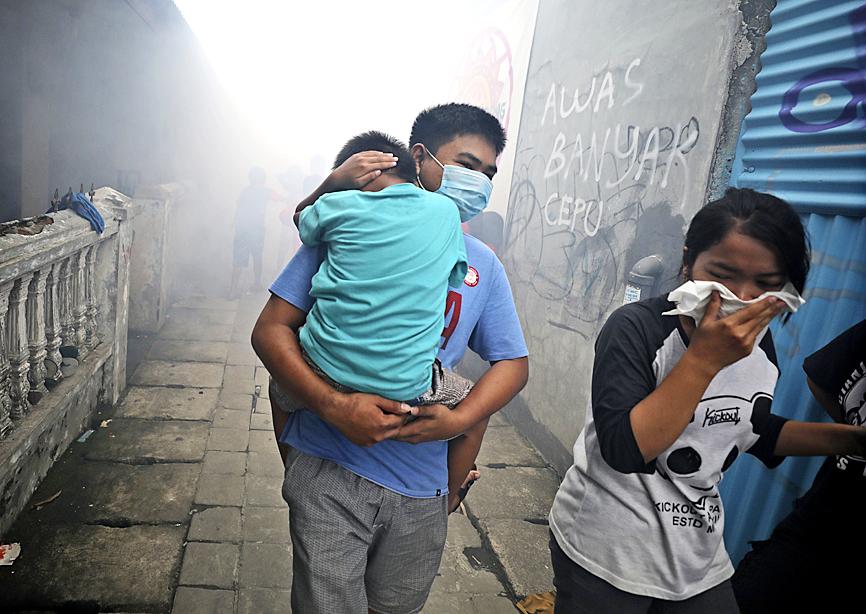To slow the spread of COVID-19, governments issued lockdowns to keep people at home. They curtailed activities that affected services like trash collection. They tried to shield hospitals from a surge of patients.
However, the cascading effects of these restrictions are also hampering efforts to cope with seasonal outbreaks of dengue fever, an incurable, mosquito-borne disease that is also known as “breakbone fever” for its severely painful symptoms.
Southeast Asian countries like Singapore and Indonesia have dealt with concurrent outbreaks of dengue fever and COVID-19.

Photo: AP
In Brazil, with more than 1.6 million COVID-19 cases, at least 1.1 million cases of dengue fever have been reported, with nearly 400 deaths, according to the Pan American Health Organization.
Cases are likely to rise further with the start of seasonal rains in Latin America and Asia.
Dengue fever is typically not fatal, but severe cases might require hospitalization. Prevention efforts targeted at destroying mosquito breeding sites, like removing trash or old tires and other objects containing standing water, are still the best ways to curb the spread of the disease.
COVID-19-related lockdowns have meant that these efforts have been reduced or stopped altogether in many countries.
In Pakistan, plans to disinfect shops and markets that had dengue fever outbreaks last year were shelved due to COVID-19, Pakistani Young Doctor’s Association president Rizwan Kundi said.
Having to identify thousands of COVID-19 cases has meant that dengue fever surveillance has suffered in many Latin American countries, International Federation of Red Cross and Red Crescent Societies Health Director for the Americas Maria Franca Tallarico said.
Experts say that disrupting such prevention efforts is ominous for the global battle against dengue fever.
Last year was the worst year on record for dengue fever cases, with every region affected, and some countries hit for the first time, according to the WHO.
Experts say that while reduced travel means fewer opportunities for mosquitoes to infect people with dengue fever to become carriers themselves, COVID-19 has introduced other variables.
Staying home ?— one way to slow COVID-19 outbreaks — poses greater risks for spreading dengue fever due to higher mosquito populations at people’s homes, said Singapore’s National Environment Agency (NEA).
The impact is already visible. Singapore recorded a five-fold increase in the mosquito larvae detected in homes and common corridors of residential areas during the two-month COVID-19 lockdown period, compared with the previous two months. By July 6, the total of dengue fever cases in Singapore was more than 15,500 and is expected to exceed the 22,170 cases reported in 2013, which at the time was the largest dengue fever outbreak in Singapore’s history, according to the NEA.
Working with communities in Latin America to stop mosquitoes from breeding had been the most successful strategy in the past few years, Tallarico said, adding that with strict limitations on movement, she doesn’t know whether these measures were still happening, and “this is the big concern.”
A shortage of protective equipment due toe COVID-19 also means limiting the number of first responders to dengue fever, she said.
Dengue fever patients need acute care, and this could lead to a “double whammy” that overwhelms health care systems, said Scott O’Neill, director of the World Mosquito Program, a non-governmental organization that focuses on mosquito-borne disease prevention.
At the Tahija Foundation Research Laboratory in Yogyakarta, Indonesia, which has been studying dengue fever, “it became too difficult to enroll patients with the social-distancing measures,” O’Neill said, adding that the facility is now being used for COVID-19 testing.

‘IN A DIFFERENT PLACE’: The envoy first visited Shanghai, where he attended a Chinese basketball playoff match, and is to meet top officials in Beijing tomorrow US Secretary of State Antony Blinken yesterday arrived in China on his second visit in a year as the US ramps up pressure on its rival over its support for Russia while also seeking to manage tensions with Beijing. The US diplomat tomorrow is to meet China’s top brass in Beijing, where he is also expected to plead for restraint as Taiwan inaugurates president-elect William Lai (賴清德), and to raise US concerns on Chinese trade practices. However, Blinken is also seeking to stabilize ties, with tensions between the world’s two largest economies easing since his previous visit in June last year. At the

UNSETTLING IMAGES: The scene took place in front of TV crews covering the Trump trial, with a CNN anchor calling it an ‘emotional and unbelievably disturbing moment’ A man who doused himself in an accelerant and set himself on fire outside the courthouse where former US president Donald Trump is on trial has died, police said yesterday. The New York City Police Department (NYPD) said the man was declared dead by staff at an area hospital. The man was in Collect Pond Park at about 1:30pm on Friday when he took out pamphlets espousing conspiracy theories, tossed them around, then doused himself in an accelerant and set himself on fire, officials and witnesses said. A large number of police officers were nearby when it happened. Some officers and bystanders rushed

Beijing is continuing to commit genocide and crimes against humanity against Uyghurs and other Muslim minorities in its western Xinjiang province, U.S. Secretary of State Antony Blinken said in a report published on Monday, ahead of his planned visit to China this week. The State Department’s annual human rights report, which documents abuses recorded all over the world during the previous calendar year, repeated language from previous years on the treatment of Muslims in Xinjiang, but the publication raises the issue ahead of delicate talks, including on the war in Ukraine and global trade, between the top U.S. diplomat and Chinese

RIVER TRAGEDY: Local fishers and residents helped rescue people after the vessel capsized, while motorbike taxis evacuated some of the injured At least 58 people going to a funeral died after their overloaded river boat capsized in the Central African Republic’s (CAR) capital, Bangui, the head of civil protection said on Saturday. “We were able to extract 58 lifeless bodies,” Thomas Djimasse told Radio Guira. “We don’t know the total number of people who are underwater. According to witnesses and videos on social media, the wooden boat was carrying more than 300 people — some standing and others perched on wooden structures — when it sank on the Mpoko River on Friday. The vessel was heading to the funeral of a village chief in